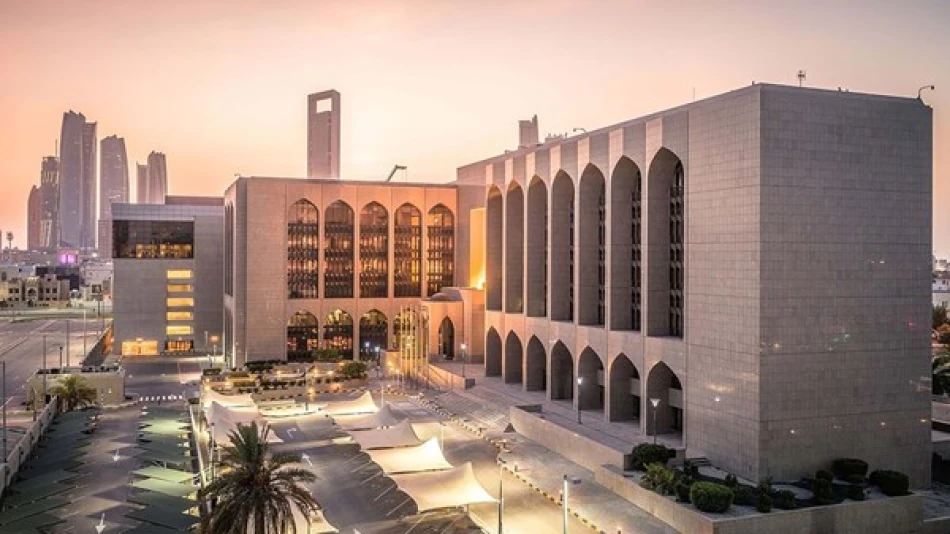
Egypt's Central Bank Releases 2024 Financial Stability Report: Insights and Outlook
UAE's Financial System Proves Resilient Amid Global Uncertainty, Digital Currency Push Accelerates
The UAE Central Bank's 2024 Financial Stability Report reveals a banking sector that has not only weathered global economic headwinds but emerged stronger, with real GDP growth hitting 4% and ambitious projections reaching 5.4% by 2026. More significantly, the Emirates is positioning itself as a digital finance pioneer through its national payment card system "Jaywan" and the advancing "Digital Dirham" central bank digital currency project, signaling a strategic shift toward financial technology leadership in the Middle East.
Banking Sector Demonstrates Exceptional Resilience
The UAE's banking system has proven remarkably robust against global financial pressures, supported by strong capital and liquidity buffers that exceed minimum regulatory requirements. Comprehensive stress tests conducted by the Central Bank in 2024 confirmed that local banks can absorb macroeconomic shocks while continuing to provide credit facilities even under adverse scenarios.
This resilience stems from improved asset quality and sustained growth momentum, particularly in non-oil sectors that serve as the primary engine for economic diversification. The banking sector's strength has become a cornerstone of the country's broader economic stability strategy, enabling continued lending and investment during uncertain times.
Non-Banking Financial Sectors Show Strong Performance
Beyond traditional banking, the UAE's insurance sector achieved remarkable growth of 21.4%, with total written premiums reaching AED 64.8 billion. This expansion reflects growing confidence in the domestic market and increased demand for risk management products. Finance companies maintained adequate capitalization with improved liquidity levels, while money exchange businesses continued demonstrating operational stability.
Digital Transformation Accelerates Financial Innovation
The year 2024 marked a pivotal moment for the UAE's digital finance ambitions. The launch of the national payment card system "Jaywan" and the widespread adoption of the instant payment platform "Aani" represent significant infrastructure investments that position the Emirates ahead of regional competitors.
Most notably, progress on the "Digital Dirham" central bank digital currency (CBDC) project places the UAE among the early adopters of sovereign digital currencies globally. This positions the country alongside China's digital yuan and ahead of many Western nations still in exploratory phases. The integration of artificial intelligence and data analytics into financial services has further enhanced system efficiency and customer experience.
Strategic Implications for Global Finance
The UAE's digital finance push carries significant implications for international markets. As traditional financial centers like London and New York grapple with regulatory challenges around digital assets, the Emirates is creating a comprehensive digital financial ecosystem that could attract fintech companies and crypto businesses seeking regulatory clarity.
Institutional Framework Strengthens Oversight
The establishment of the UAE Financial Stability Board under the leadership of Sheikh Mansour bin Zayed Al Nahyan represents a crucial institutional development. This body enhances coordination between key regulatory authorities and enables more effective systemic risk monitoring, similar to frameworks established in Singapore and Switzerland.
The Central Bank has simultaneously strengthened supervisory frameworks by introducing new macroprudential tools, tightening cybersecurity requirements, and advancing sustainable finance initiatives. These measures align with global best practices while addressing climate change risks, positioning the UAE as a responsible financial center.
Economic Outlook Remains Optimistic
The UAE's economic trajectory appears increasingly positive, with GDP growth projections of 4.4% for 2025 and 5.4% for 2026. This growth is primarily driven by non-oil sectors, demonstrating successful economic diversification efforts that reduce dependence on hydrocarbon revenues.
Central Bank Governor Khalid Mohamed Balama emphasized the institution's commitment to supporting the leadership's vision and strategic objectives through continued development of regulatory frameworks. This approach ensures sustainable resilience while promoting financial and economic stability.
Regional Leadership in Financial Innovation
The UAE's comprehensive approach to financial system modernization sets it apart from regional competitors. While Saudi Arabia focuses heavily on Vision 2030 initiatives and Qatar prepares for post-World Cup economic transitions, the Emirates has created a more integrated digital financial ecosystem that appeals to international investors and fintech innovators.
The combination of regulatory sophistication, technological infrastructure, and economic diversification creates a compelling value proposition for global financial institutions seeking Middle Eastern exposure. This positioning becomes increasingly valuable as geopolitical tensions drive businesses to seek stable, well-regulated alternative financial centers.
Most Viewed News

 Layla Al Mansoori
Layla Al Mansoori






